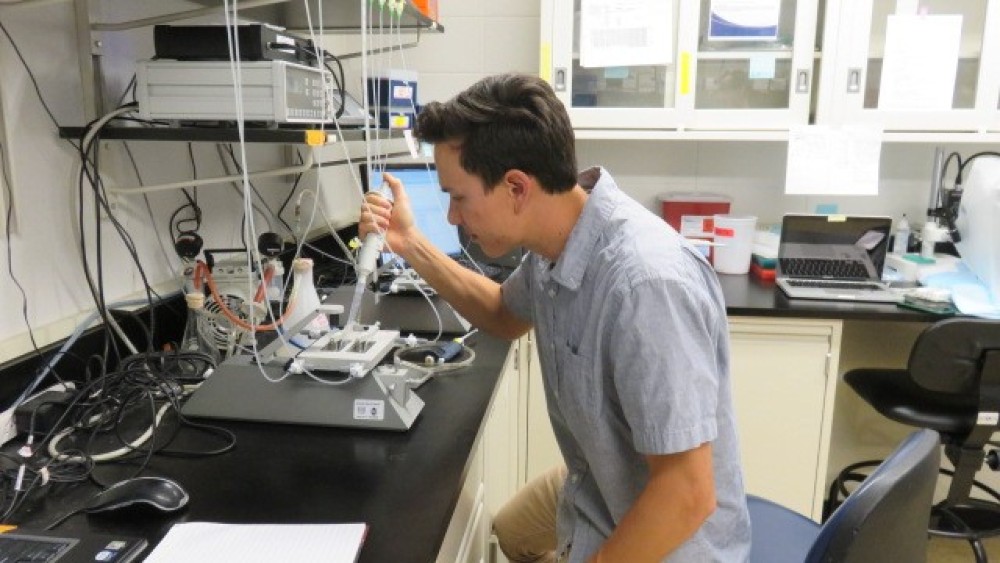
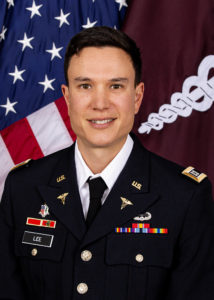
Graduate degrees in food science and nutrition from Colorado State University’s Department of Food Science and Human Nutrition equip alumni with the knowledge and skills for careers in academic research or healthcare settings. Dustin Lee (M.S., ’16; Ph.D., ’19) chose an unconventional path that aligns his interests in clinical care, nutrition research, and teaching, all while serving soldiers, veterans, and his country in the U.S. Army.
Lee currently serves as a commissioned officer and the chief of education and research, at the Brooke Army Medical Center’s Department of Nutritional Medicine in San Antonio, and an assistant professor under Baylor University with the Army-Baylor Master’s Program in Nutrition at the U.S. Army Medical Center of Excellence – all just three years after earning his Ph.D. Honoring these achievements, and his contributions to nutrition research and impressive trajectory through the military, Lee has been named a College of Health and Human Sciences Emerging Leader Alumnus for 2023.
“Unsurprisingly, Dustin has moved through the Army ranks at lightning speed,” said his CSU faculty mentor and nominator, Chris Gentile, who is head of the Department of Food Science and Human Nutrition. “That path certainly was not the easiest for someone with his degrees and skillset. Still, he chose to commission in the U.S. Army, go through initial training, and dedicate his career to helping the nation’s soldiers and veterans.”
Beyond the bubble
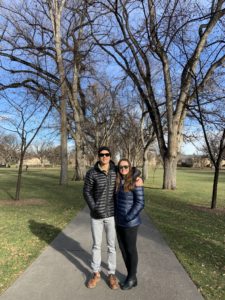
The Lakewood, Colorado, native cultivated his interest in science and sense of adventure from an early age through hunting, biking, and backpacking. When looking to college, something far away seemed appealing to Lee. “At that point in my bubble of a world, I wanted to get out and do something different,” he said. He pursued his bachelor’s degree in food science and human nutrition at the University of Hawai’i at Mānoa, which prepared him for a dietetic internship at the University of Louisiana at Lafayette. There he met Skye Murphy, now his wife, who is also a dietitian, and they bonded over professional and personal interests. The couple moved to Colorado, where Lee worked as a clinical dietitian for two years in Aurora.
Lee’s sense of adventure pushed him to dive deeper into the field of nutrition. “I always enjoyed the science,” Lee said of his impetus to pursue graduate studies. “And, I have a tendency to challenge myself.” His sister had earned her bachelor’s degree at CSU so, “I knew Fort Collins was a great place.” He reached out to Mary Harris, who retired in 2020 with professor emerita status. “I knew I wanted to work with her as a teaching assistant, but I wasn’t sure about research.”
Seamless transition
Gentile welcomed Lee to his Integrative Cardiovascular Physiology Lab, which Lee found aligned with his interests in biochemistry and physiology. “I didn’t have experience in pre-clinical settings,” he said, explaining that at first, “It was a little uncomfortable.” Pushing himself, he soon found he thrived in the challenges of research exploration, and he earned recognition and scholarships that fueled his progress.
“Dr. Gentile’s mentorship style lent a lot of autonomy, which I very much appreciate. He allowed failures, allowed mistakes. The team approach was a comfortable environment to learn in. I also had an outstanding lab mate, Micah Battson, who I am similarly indebted to for my success in the lab.” It may have been comfortable, but the learning was still hard work: “I’d be lying if I said grad school was all rainbows and butterflies,” Lee said with a chuckle.
The challenges paid off. Lee honed his instructional skills as Harris’s teaching assistant, and his lab work with co-mentors Gentile and Tiffany Weir yielded recognition. Moving from his master’s to a Ph.D. program was seamless, Lee remembered. “I went straight from one to the other.”
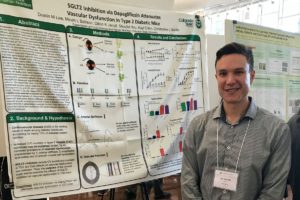
“Dustin was incredibly successful during his Ph.D. training,” Gentile said in Lee’s award nomination. “He authored 10 peer-reviewed publications and received 11 local, regional, and national awards.”
Lee enjoyed the communities he found at CSU – in the lab, in the classroom, and in the community. “We all got along, and took research seriously,” he said of his peers. Gentile and Weir were “down to earth” and could joke around, but also knew when to take things seriously.
The next logical step for a Ph.D. graduate in nutrition is generally a post-doctoral research role that paves the way to a faculty appointment. “I was exploring next steps,” Lee said, “and was a little hesitant seeing how competitive it is to get grant funding.” Although he was well-positioned for a tenure track teaching and research role, and interviewed for a few post-doc roles, he and Murphy were also looking for financial stability for the next phase of their married life.
Culture shock, luck, and self-advocacy
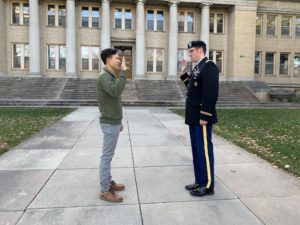
“Upon graduating with his Ph.D. Dustin decided to eschew the typical career paths of academics and industry and instead joined the U.S. Army in order to apply his knowledge of nutrition and physiology towards helping U.S. soldiers and veterans,” Gentile said.
“Dustin was offered several opportunities as he looked past his Ph.D. His choice to pursue this role in the Army has been a great opportunity for him to apply his diverse skillset and definitely appeals to his sense of adventure and his disciplined demeanor,” Weir added.
“It was kind of like how I jumped into [graduate school] – the Army was sort of foreign to me,” Lee said, explaining that he didn’t have any immediate family members who had a history of military service, and he knew little of his grandfather’s experience in the Navy. “I came in a little naïve.”
“In graduate school, I found my identity and place in academia,” he recalled. He learned the language of the lab and proved himself as a researcher. His specific skills and doctoral degree made him feel special, but he quickly learned that in the Army, all members are soldiers first, and professionals second. “They don’t necessarily care if I can excise an artery from a mouse,” Lee said.
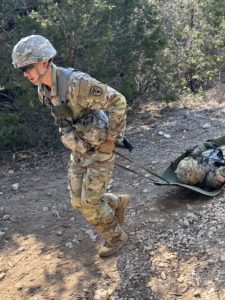
After initial training and a bit of culture shock, Lee learned the language of the military, with new skill sets and acronyms. “I had some good luck and self-advocating when I joined,” he recalled. By sharing his skills and interests, he was assigned to Brooke Army Medical Center, which felt like a familiar place with professionals in academia connected through Army-Baylor’s graduate programs across the street at Fort Sam Houston.
Performance focus
Being a soldier suits Lee’s active lifestyle: “I enjoy working out, and I am somewhat competitive.” He also appreciates that he gets to do things you don’t get to do in a civilian job, like going to a shooting range.
As a commissioned officer, Dustin must remain deployment ready. “Dustin’s position in the U.S. Army is rooted entirely in service to his nation,” lauded Gentile. “His primary role is in conducting research that helps to maximize the readiness of U.S. troops and ensure they are nutritionally and physiologically capable of enduring the rigorous demands of combat. His research also extends to U.S. veterans and improving veteran health and well-being.”
Compared to his prior clinical and research experience, Lee noted that “The Army is less focused on chronic disease and more about performance nutrition.” The population of soldiers he serves is healthier than the general population, so the priority is helping individuals be their best. “Like NFL football players, the Army wants soldiers to perform the best they can,” Lee said.
Nourishing community
Today, Lee emulates his mentors as he guides graduate students in Army-Baylor Master’s Program in Nutrition alongside his ongoing research and role as a clinical dietitian.
“I was productive and successful [in graduate school] because of his mentorship,” Lee remarked about Gentile. “I’ve tried to carry that forward. His mentorship style, success in academia, and ability to build a cohesive team are invaluable traits I attempt to mirror. I’m grateful to have worked under Dr. Gentile and Dr. Weir.”
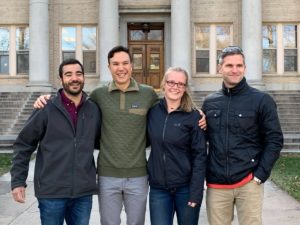
“CSU in general and the department specifically made me feel part of a community,” Lee reflected. He appreciated the walkability, public transit, and bike options around campus and Fort Collins. “I liked being at a forward-thinking, environmentally friendly university. It felt like home. My lab mate even brought a compost program into the department.,” he said.
Although he misses Fort Collins, the mountains, and four seasons, Lee has built community in San Antonio, too. He has found a mentor – like himself, a Ph.D. registered dietitian, who knows the acronyms of the science and the military. He supervises eight students through clinical rotations and research projects.
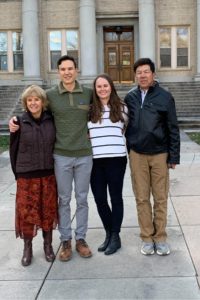
Murphy remains stalwart in her support of Lee’s adventures: “Shout out to my wife, who has been super-supportive on this unknown journey that is foreign to both of us,” Lee said. He expressed delight that she got a job as a civilian dietitian in the same hospital.
Lee and Murphy visit Colorado whenever they can to see family. A recent swing through Fort Collins included a stop by the Gifford Building to visit Gentile and Weir.
“I had a wonderful experience,” Lee said of his time at CSU. “I’d never trade it for anything.”
The Department of Food Science and Human Nutrition is part of CSU’s College of Health and Human Sciences. Explore all 2023 CHHS Award winners.
The view(s) expressed herein are those of the author(s) and do not reflect the official policy or position of Brooke Army Medical Center, the U.S. Army Medical Department, the U.S. Army Office of the Surgeon General, the Department of the Army, and Department of Defense or the U.S. Government.